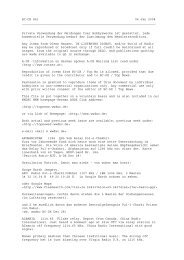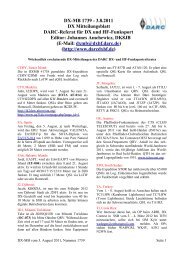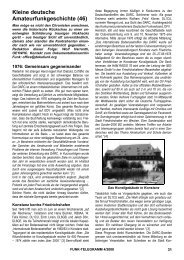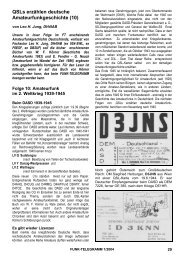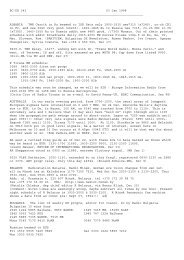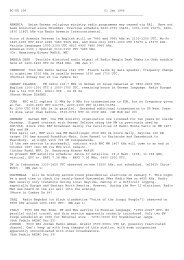- Page 1 and 2:
WORLDWIDE DX CLUB Weekly Top News W
- Page 3 and 4:
ID as "R.Emissora da Educacao Rural
- Page 5 and 6:
New Beijing tx on 13580 kHz heard 0
- Page 7 and 8:
adio Chorus incl. Cassette, Antenna
- Page 9 and 10:
11800 1600 1700 41 101 110 216 1234
- Page 11 and 12:
7285 2300 0400 36 204 230 218 12345
- Page 13 and 14:
Anlage sendete in der Zeit des Kalt
- Page 15 and 16:
e live until 1545 UT, but obviously
- Page 17 and 18:
Unter gibt es die Moeglichkeit zum
- Page 19 and 20:
month. (press release R NZ, Dec 21,
- Page 21 and 22:
6140 1900-2100 200 RFE 7415 2300-24
- Page 23 and 24:
Irkutsk 5890 1400-1500 100 SHI 5890
- Page 25 and 26:
TAIWAN According to Taiwanese DXer
- Page 27 and 28:
Different feeling here in Germany.
- Page 29 and 30:
1600-1700 VOA Bangla NF 11970, ex 1
- Page 31 and 32:
Die Ausstellung im Lichthof des Geb
- Page 33 and 34:
BC-DX 743 13 Jan 2006 _____________
- Page 35 and 36:
0400-2300 / 7145 / 5 / Grodno / The
- Page 37 and 38:
6010 kHz. 54444 at 0112 UT Talk by
- Page 39 and 40:
"In the last 75 years the mission h
- Page 41 and 42:
(Chuck Bolland-FL-USA, dxld Jan 5)
- Page 43 and 44:
operated in AM. I wonder if part of
- Page 45 and 46:
1730 Sun on 9980 SDA 100 kW / 300 d
- Page 47 and 48:
Century, and Kyrgyz state TV, altho
- Page 49 and 50:
11915, AWR, SNG via Dhabbaya, Unite
- Page 51 and 52:
UNID 9483/9485. [Voice of Liberty E
- Page 53 and 54:
in mid-tune to stronger 11705[250 k
- Page 55 and 56:
scheduled) and at 2035 on 7185 (Eng
- Page 57 and 58:
BHUTAN I am pretty sure the 0100 UT
- Page 59 and 60:
Cloture's [Coulter?? Gag] appearanc
- Page 61 and 62:
While the western world is cutting
- Page 63 and 64:
(Ron Howard-CA-USA, DXplorer Jan 15
- Page 65 and 66:
INDIA [to Kashmir] 6100, R. Sedaye
- Page 67 and 68:
"Malaysia" a couple of times at ToH
- Page 69 and 70:
(a typo for 9615 which appears in t
- Page 71 and 72:
Albeit partly for good reasons, tho
- Page 73 and 74:
AWR Samara. Another interesting opp
- Page 75 and 76:
(Mauno Ritola-FIN, hcdx Jan 17) Doe
- Page 77 and 78:
a n d availability of consumer rece
- Page 79 and 80:
BC-DX 745 28 Jan 2006 _____________
- Page 81 and 82:
15160 1400-2100 18,28 BOU 50 20 206
- Page 83 and 84:
IRRS tx site [not Milano-Italy wb.]
- Page 85 and 86:
COSTA RICA 5054.6 Faro del Caribe,
- Page 87 and 88:
125 RMI 17660 1330 1400 48,39S 304
- Page 89 and 90:
100 BVB 9470 1900 2015 39,40 101/01
- Page 91 and 92:
7110 2000 2030 40 104/00 105 216 01
- Page 93 and 94:
Rundfunks for the first time on Jan
- Page 95 and 96:
ancr and mx from 1313 tune to 1328
- Page 97 and 98:
monitored by wb on Jan 21/22/23) La
- Page 99 and 100:
2010 "programa de ... Insurgente" "
- Page 101 and 102:
Again, it would be a lot nicer, if
- Page 103 and 104:
Sout Al Amal means Voice of Hope Fu
- Page 105 and 106:
twice per year. On top of all that,
- Page 107 and 108:
Trots att det aer vinter och kylvat
- Page 109 and 110:
no longer able to have access to FB
- Page 111 and 112:
two copies PRICE of the new 20th ed
- Page 113 and 114:
THE TERRIBLE THING IS THAT TO US LI
- Page 115 and 116:
Funkfernschreiben, Modulationsarten
- Page 117 and 118:
1458 1700 1800 CRI BULGARIAN N-D 14
- Page 119 and 120:
For more information contact: Tim A
- Page 121 and 122:
4.00 Mo Arabic, Tu Farsi, We Russia
- Page 123 and 124:
AM-Empfang noch nicht voellig tot.
- Page 125 and 126:
(via Mike Terry, mwdx Jan 29) LESOT
- Page 127 and 128:
AWR on new 7480. AWR noted on new 7
- Page 129 and 130:
NA on one of the NA websites, and t
- Page 131 and 132:
Station founder Paul Rusling admitt
- Page 133 and 134:
immediately above and below) is oft
- Page 135 and 136:
USD 54,00 / night, including breakf
- Page 137 and 138:
BC-DX 747 11 Feb 2006 _____________
- Page 139 and 140:
had the most sincere, down to earth
- Page 141 and 142:
(RNW MN NL via BrDXC-UK, Feb 7) Dea
- Page 143 and 144:
CROATIA Re Croatia DRM on 594 kHz:
- Page 145 and 146:
(Kai Ludwig-D, wwdxc BC-DX Feb 10)
- Page 147 and 148:
eingegraben. Dafuer haben wir dann
- Page 149 and 150:
(wb, wwdxc BC-DX Feb 9) Re Luch: Lu
- Page 151 and 152:
(Tarek Zeidan-EGY SU1TZ, dxld Feb 8
- Page 153 and 154:
have a different sound than on the
- Page 155 and 156:
PAKISTAN After an interruption of a
- Page 157 and 158:
(Rich D'Angelo-PA-USA, DXplorer Feb
- Page 159 and 160:
6045 2200 2300 UDO 500 30 7140 2200
- Page 161 and 162:
The Board of Governors' proposed $6
- Page 163 and 164:
MOS 1430 1500 Afar Djibouti, NE-ETH
- Page 165 and 166:
wirtschaftlich gerechtfertigt werde
- Page 167 and 168:
it participates in the conferences
- Page 169 and 170:
Internet gestellt. Download unter
- Page 171 and 172:
ASCENSION ISLAND US military blamed
- Page 173 and 174:
possibilities of our long range Med
- Page 175 and 176:
Wilhelmsen zwar aus formalen Gruend
- Page 177 and 178:
24.2.2006, 20.30 Uhr Ortszeit Bayer
- Page 179 and 180:
songs and mx, 35443. (Arnaldo Slaen
- Page 181 and 182:
17680: at 1335 something seemed to
- Page 183 and 184:
All these comments I can UNDERLINE
- Page 185 and 186:
currently running its HF centre, CE
- Page 187 and 188:
disapate the heat were the major pr
- Page 189 and 190:
YEMEN QSL Radio Sana'a. Nach 8 Vers
- Page 191 and 192:
We fully anticipate that DRM implem
- Page 193 and 194:
freqs mentioned in your e-mail? - W
- Page 195 and 196:
BC-DX 749 25 Feb 2006 _____________
- Page 197 and 198:
9677.46 ... .64 kHz AZE. Adalan Sas
- Page 199 and 200:
Itatiaia). 5980 R. Guaruja, Florian
- Page 201 and 202:
(Jim Pogue-TN-USA, hcdx Feb 22) CHI
- Page 203 and 204:
11970 0430 0700 27,28 GAB 500 350 V
- Page 205 and 206:
17630 R AFNO not heard at 0700 UT,
- Page 207 and 208:
the Afropop station continued on 17
- Page 209 and 210:
(Ralph Brandi-USA, DXplorer Feb 19)
- Page 211 and 212:
until 0935 UT. At that point a woma
- Page 213 and 214:
Gradually even the civil servants s
- Page 215 and 216:
The tx site that "took over" from G
- Page 217 and 218:
[Clandest to Cameroon] 11840 Radio
- Page 219 and 220:
7160 250 54 1300-1315 RTG JAPA 7160
- Page 221 and 222:
After more background to the period
- Page 223 and 224:
again at 1256). 60 kW. (Ralph Brand
- Page 225 and 226:
Horst Wiese von HCJB kommt zu Besuc
- Page 227 and 228:
UT only. (via ARC MV-Eko, Feb 27) A
- Page 229 and 230:
CZECH REP Summer A-06 schedule of R
- Page 231 and 232:
als Treuhaender fuer die Russische
- Page 233 and 234:
VOA has only 7 and 9 MHz. band ante
- Page 235 and 236:
While we wait for such occasions, a
- Page 237 and 238:
from Bologna M-Sa 0620-0630 and 111
- Page 239 and 240:
To ME & NoAF Arabic 0400-0430 17780
- Page 241 and 242:
SCG [KOSOVO] Kosovo 1413 re tx plan
- Page 243 and 244:
Tuerkisch 5960 1600-2200 EMR 500 Tu
- Page 245 and 246:
15520 1600-1700 smtwtfs YFR Dhabbay
- Page 247 and 248:
Eine Art Hilfeschrei von Radio Tash
- Page 249 and 250:
Deutschprogramm hinein zu h"ren. Sc
- Page 251 and 252:
BC-DX 751 11 Mar 2006 _____________
- Page 253 and 254:
As for myself I continued on shift
- Page 255 and 256:
esponse so far. AFN Broadcast Cente
- Page 257 and 258:
9790 2000-2200 37E,38W,47,ISS 500 1
- Page 259 and 260:
15790 0600-1700 37E,38 ISS 30 145 N
- Page 261 and 262:
12130 / 285 deg Manipuri 1400-1415
- Page 263 and 264:
All time listed are Israel Standard
- Page 265 and 266:
(Toshimichi Ohtake-JPN, dswci DXW F
- Page 267 and 268:
many times and gave several dates;
- Page 269 and 270:
complaints from parents that school
- Page 271 and 272:
1700-1800 daily Af 11850 Issoudun 5
- Page 273 and 274:
0500-0600 9525 RMP 500 kW 140 deg E
- Page 275 and 276:
A06 AWR Broadcast Schedule (2006-03
- Page 277 and 278:
SDA 2200-2230 Indonesian W-Indonesi
- Page 279 and 280:
1026 Hassi Messaoud Radio El Wahat
- Page 281 and 282:
BOLIVIA R. Yura, 4717 kHz, no-data
- Page 283 and 284:
UT, phone-in prgr, annmts for mx pr
- Page 285 and 286:
1800-1900 -daily- East Europe 7500
- Page 287 and 288:
Radio China International wurde ber
- Page 289 and 290:
the signal was weak)-1730 UT (by th
- Page 291 and 292:
Romanian 1600-1630 .....6. 6245ar 7
- Page 293 and 294:
freq of 12120/292 at 0500-1000 UT t
- Page 295 and 296:
(**) On Saturday and Sunday UTC 120
- Page 297 and 298:
the other end. KOL 5915 kHz is a ti
- Page 299 and 300:
Date: Tuesday 14 March 2006. Time:
- Page 301 and 302:
1600-1900 17680 300 144deg 1900-230
- Page 303 and 304:
Now Hollyer passes along an account
- Page 305 and 306:
U.K./SUDAN 17660 sSIRI, southern Su
- Page 307 and 308:
WHRI Angel 2: 2030 Sun on 9840. KWH
- Page 309 and 310:
Atlantic, northern Africa, and cent
- Page 311 and 312:
Karte ist nun ein hoechstgeschaetzt
- Page 313 and 314:
(Gerhard Werdin-D, dswci DXW Mar 22
- Page 315 and 316:
6040 1000 1200 7,8,11NW 250 240 0 M
- Page 317 and 318:
Ich habe nie eine CONGO Station geh
- Page 319 and 320:
(chairing), Sharad Sadhu - chairman
- Page 321 and 322:
they still seem to hesitate from do
- Page 323 and 324:
Hungarian to SoAm 2200-2258 Daily 9
- Page 325 and 326:
apprised about govt policies and pr
- Page 327 and 328:
1030-1130 15580 INSn 1200-1230 1183
- Page 329 and 330:
is the url where one can see the an
- Page 331 and 332:
1100-1200 on 15675(1) and 9950(2) t
- Page 333 and 334:
15825 1000-2200 02 Apr 06-31 May 06
- Page 335 and 336:
3306.5 kHz. (Jari Savolainen-FIN, h
- Page 337 and 338:
According to 'A06 - Shijak & Fllaka
- Page 339 and 340:
pxs at exact freq. S/on and s/off t
- Page 341 and 342:
with the Firedrake jamming, also ag
- Page 343 and 344:
1900 0500 6050 50 18/172 Ecuador 11
- Page 345 and 346:
9590 1900-2200 37,38,46,47,48N ISS
- Page 347 and 348:
2000-2100 French 2100-2200 Sodrushe
- Page 349 and 350:
T-Systems and its parent Deutsche T
- Page 351 and 352:
Die 700 kW wieder ergaben sich dama
- Page 353 and 354:
6205 1930-2030 27,28 KAM 500 304 72
- Page 355 and 356:
old frequency. Very strong on clear
- Page 357 and 358:
I apologise for not being able to g
- Page 359 and 360:
Urdu 9375 1330-1530 38, 39, 46, 47
- Page 361 and 362:
1500-1600 9660 (972 from 1530) 1600
- Page 363 and 364:
FEBA RADIO 1430-1500 12125 250 1234
- Page 365 and 366:
1430-1525 7180 ITALIAN 1630-1655 96
- Page 367 and 368:
Falklands" programme this evening 2
- Page 369 and 370:
4930 Botswana[-1600 extended], 6080
- Page 371 and 372:
Sender. (Reinhold Schuttkowski-D, A
- Page 373 and 374:
(wb, wwdxc BC-DX April 6) Noted Rad
- Page 375 and 376:
Africa English 0400-1500 6065 South
- Page 377 and 378:
program past 2330. Weak with very l
- Page 379 and 380:
DRM DRM update. It was great to mee
- Page 381 and 382:
RTI Russian 15195 1300-1400 28-30 I
- Page 383 and 384:
AFRICA 2300-2400 9375 Gr 0500-1000
- Page 385 and 386:
693drm Just checked 693 kHz after 2
- Page 387 and 388:
Monday 0110-0200 5960(UK)/17560kHz
- Page 389 and 390:
By the way, after I sent my message
- Page 391 and 392:
1900-1956 7165 7215 9590 9770 ITALI
- Page 393 and 394:
sideband. Conclusion: 13665 kHz cha
- Page 395 and 396:
of Flash installed to view the vide
- Page 397 and 398:
national telecoms authorites and as
- Page 399 and 400:
Contrary to previously published re
- Page 401 and 402:
how to order. You can also find thi
- Page 403 and 404:
Der VTH-Verlag hat dankenswerterwei
- Page 405 and 406:
BC-DX 756 22 Apr 2006 _____________
- Page 407 and 408:
ALGERIA 702 MW RTA Chaine 1, Djelfa
- Page 409 and 410:
BOLIVIA 4409.8, 0315-, Radio Eco Ma
- Page 411 and 412:
with Radio Maria IDs. 4814.9, 0232-
- Page 413 and 414:
last DX will apparently be May 6! I
- Page 415 and 416:
GERMANY/PORTUGAL "The voices of Ame
- Page 417 and 418:
1593 kHz. Offensichtlich wird der n
- Page 419 and 420:
hearing two stations mixing; one wr
- Page 421 and 422:
1500-1600 Radio Polonia, Belarusian
- Page 423 and 424:
4386.6, 0249-, Imperio Radio Mar 15
- Page 425 and 426:
1030-1127 11850 Vietnamesisch 1130-
- Page 427 and 428:
till 30.Jun.2006 Dari/Pashtu 1200-1
- Page 429 and 430:
"i") txs for years. In both cases t
- Page 431 and 432:
(Ashik Eqbal Tokon-BGD, dxld Apr 12
- Page 433 and 434:
ex 1700-1800 on 6040 9700 11520 183
- Page 435 and 436:
(WDXC-UK Contact April, Apr 4) Plea
- Page 437 and 438:
BC-DX 757 28 Apr 2006 _____________
- Page 439 and 440:
5959.9 R. Itatiaia, Belo Horizonte
- Page 441 and 442:
open between here and South America
- Page 443 and 444:
1593 WDR DRM test. Wenn man heute e
- Page 445 and 446:
with continued development and test
- Page 447 and 448:
h..: 9605 cancelled (17820 remains)
- Page 449 and 450:
the Kavala txions will immediately
- Page 451 and 452:
1200-1300 Korean NF 9880 SDA 100 kW
- Page 453 and 454:
0330-0430 AFG Dari 15615 0430-0530
- Page 455 and 456:
Russian WS 1200-1300 999 999 Chisin
- Page 457 and 458:
... (Carlos Goncalves-POR, dxld Apr
- Page 459 and 460:
German 1500-1600 603 603 Germany Eu
- Page 461 and 462:
RMR 2000-2100 1143 1143 Kaliningrad
- Page 463 and 464:
New freq (ex 5960 kHz & 7330 kHz) (
- Page 465 and 466:
Tanzania, so the distance to it whe
- Page 467 and 468:
ID "Super Power KTBN Salt Lake City
- Page 469 and 470:
BC-DX 758 05 May 2006 _____________
- Page 471 and 472:
Linzer bei seiner 2598. und letzten
- Page 473 and 474:
(Carlos Goncalves-POR, wwdxc BC-DX
- Page 475 and 476:
"DSWCI 50 Years" for times and fqys
- Page 477 and 478:
Radio Station HCJB, the Voice of th
- Page 479 and 480:
1900-2100 NF 13810 JUL 100 kW / 160
- Page 481 and 482:
0800-1400 15690 Farda Farsi - via I
- Page 483 and 484:
Zielgebiete sind in 225 Grad Azimut
- Page 485 and 486:
2200 Spanish 13760 15245 WEu 2300 J
- Page 487 and 488:
4834.9 R. Mali, Kati, (reactivated,
- Page 489 and 490:
Czech 1745-1830 1170 1170 Mogilev E
- Page 491 and 492:
Arabic 1500-1600 5925 5925 Novosibi
- Page 493 and 494:
freq.: 171 khz callsign: RW-444 mod
- Page 495 and 496:
0400-0500 Persian on 9510 DHA 250 k
- Page 497 and 498:
BC-DX 759 14 May 2006 _____________
- Page 499 and 500:
AUSTRALIA The second tx of HCJB Aus
- Page 501 and 502:
They look like portables for childr
- Page 503 and 504:
Zum Open House ab 17 Uhr laden Helg
- Page 505 and 506:
Checked out the 17600 ... 17700 ran
- Page 507 and 508:
Und auch aus Wertachtal kommt eine
- Page 509 and 510:
mindestens 10-12 kHz Bandbreite. An
- Page 511 and 512:
INDONESIA 3987 RRI Manokwari 1st no
- Page 513 and 514:
eing jammed by Pyongyang, Chief Cab
- Page 515 and 516:
5890 Irkutsk-RUS 100kW 125deg LATVI
- Page 517 and 518:
is something of an experiment, and
- Page 519 and 520:
Amharic, 1500 sign on with opening
- Page 521 and 522:
(wb, May 7) SWEDEN GRIMETON RADIO/S
- Page 523 and 524:
first time in many years and was su
- Page 525 and 526:
Radio Solh/Radio Peace 0200-0900 on
- Page 527 and 528:
Please follow the simple instructio
- Page 529 and 530:
750'000 inhabitants, more than 90%
- Page 531 and 532:
independence from France in 1975. T
- Page 533 and 534:
Tram 10, formerly used on 1575 kHz
- Page 535 and 536:
stellt einen weiteren wichtigen Mei
- Page 537 and 538:
usual level S=4-5 at 1530 UT. Both
- Page 539 and 540:
(A. Ishida-JPN, Nagoya DXers, wwdxc
- Page 541 and 542:
It appears that RN has further tran
- Page 543 and 544:
PAPUA NEW GUINEA 3345 R. Northern 1
- Page 545 and 546:
1242 Vietnam 1260 R. Radonezh (loca
- Page 547 and 548:
which is closer to the European sta
- Page 549 and 550:
12 2200- 17310 kHz 0412-1010 18160
- Page 551 and 552:
1600-1630 on 11865 WOF 300 kW / 075
- Page 553 and 554:
Grundig 7 reviews Icom 6 reviews Ja
- Page 555 and 556:
will be tested on MW in the US. One
- Page 557 and 558:
BC-DX 761 31 May 2006 _____________
- Page 559 and 560:
(Carlos Goncalves-POR, wwdxc BC-DX
- Page 561 and 562:
Burkinabe Ministry of Information a
- Page 563 and 564:
would not be surprised if it is for
- Page 565 and 566:
(R BULGARIA DX MIX News, Ivo Ivanov
- Page 567 and 568:
The expansion of DRM (Jamming) txio
- Page 569 and 570:
HONDURAS 3250.05 R. Luz y Vida 1103
- Page 571 and 572: whereas // 6600 was heavily jammed,
- Page 573 and 574: [FRANCE/GABON LIBYA non] Additional
- Page 575 and 576: Radio Boskopoe relays via Bonaire r
- Page 577 and 578: (Ron Howard, Shanghai-CHN, DXplorer
- Page 579 and 580: 12015 (7230) 1800-1900 200 12055 15
- Page 581 and 582: man. Woman comments again. At 0845,
- Page 583 and 584: RTI name. The RTI logo is now displ
- Page 585 and 586: VT Communications continues to push
- Page 587 and 588: 0900-1100 English 9450 IRK 250 kW /
- Page 589 and 590: The only changes are: 0200-0320 Ind
- Page 591 and 592: BC-DX 762 13 June 2006 ____________
- Page 593 and 594: Russ), then mx (Azer folk mostly).
- Page 595 and 596: noted the following day. 4965 R. Al
- Page 597 and 598: EGYPT 15365 R Cairo in Arabic at 14
- Page 599 and 600: The HFCC list shows powers of 125 k
- Page 601 and 602: GREECE Updated summer A-06 of ERA-5
- Page 603 and 604: 1830-1930) and even suspected wheth
- Page 605 and 606: 0530-0550 Romanian 9670 11795 0625-
- Page 607 and 608: their frequency/wavelength is liste
- Page 609 and 610: Vladivostok, June 11 at 1200-1457;
- Page 611 and 612: mosquito net, the greater the level
- Page 613 and 614: With direction loop antenna also BR
- Page 615 and 616: 15825 1000-2200 7465 2200-0100 3215
- Page 617 and 618: off annts including MW, SW, and FM
- Page 619 and 620: the sce has recommenced broadcastin
- Page 621: Villarreal's observation was correc
- Page 625 and 626: allocates additional freq resources
- Page 627 and 628: Media Network has been advised that
- Page 629 and 630: Foreign Language Transmissions 1300
- Page 631 and 632: So SW may again become the best way
- Page 633 and 634: Still registered til 1700 UT (wb) 1
- Page 635 and 636: (Udo Krueger-D, wwdxc BC-DX June 14
- Page 637 and 638: .053226,0.171661&t=k&om=1> (wb, wwd
- Page 639 and 640: Remarkable is NO sce to AUS/PAC/NZL
- Page 641 and 642: TAIWAN/RUSSIA/JAPAN/D.P.R. KOREA Pl
- Page 643 and 644: I heard all txions loud and clear i
- Page 645 and 646: 13675 / 162 deg to CeSoAf 0800-0858
- Page 647 and 648: year-old Russian sce on radio will
- Page 649 and 650: target for DRM SW broadcasting. The
- Page 651 and 652: 2006. Adil's a great salesman for h
- Page 653 and 654: Tom Lucey of the FCC International
- Page 655 and 656: BC-DX 764 28 June 2006 ____________
- Page 657 and 658: 17 dB, operating on a revised tempo
- Page 659 and 660: SINPO 34433 here in Germany around
- Page 661 and 662: Hallo Wolfgang, in der Magdeburger
- Page 663 and 664: on 3181, 3132, 3203, 3258, 3234, 32
- Page 665 and 666: Vilnius-LTU broadcaster on their ow
- Page 667 and 668: 6050, Suara Islam via RTM-Kajang (s
- Page 669 and 670: listened to RNZI every day for nx f
- Page 671 and 672: from Tokyo, Japan". Good: best rece
- Page 673 and 674:
0245-0300 Daily PASHTO 6145 DHA 250
- Page 675 and 676:
Monitoring Times, via wwdxc BC-DX J
- Page 677 and 678:
BC-DX 765 07 July 2006 ____________
- Page 679 and 680:
17530 XIA 500 kW 190 deg 1000-1057
- Page 681 and 682:
Google Earth coordinates: RHC Bauta
- Page 683 and 684:
Engl. Kanal-E -2553 Fischer -2554 S
- Page 685 and 686:
(wb, wwdxc BC-DX Feb 8, 2005) NASWA
- Page 687 and 688:
999 Rimini Viserba, 2 mast east-wes
- Page 689 and 690:
Broadcast Partners was involved. We
- Page 691 and 692:
P1 and P2 programs primarily aimed
- Page 693 and 694:
Click The location of this an
- Page 695 and 696:
true enclave has its borders with L
- Page 697 and 698:
(wb, hcdx June 30) Since CNR1 had n
- Page 699 and 700:
Bengali, Gujarati, Punjabi (je 5),
- Page 701 and 702:
Ausstellung im Haus der Wirtschaft
- Page 703 and 704:
BC-DX 766 19 July 2006 ____________
- Page 705 and 706:
ANGOLA 1088 RNA (tent), Mulenvos, o
- Page 707 and 708:
BOLIVIA 4796.5 R. Mallku, Uyina via
- Page 709 and 710:
f/ball match rpt, advts; 43432, adj
- Page 711 and 712:
und eine in Mocambique.Eine eindeut
- Page 713 and 714:
But the HFCC entries show for 100 k
- Page 715 and 716:
transmitted as a fundamental on tha
- Page 717 and 718:
die DW, BBC oder Radio Nederland -
- Page 719 and 720:
1359 kHz // 1431 kHz (Dresden-Wilsd
- Page 721 and 722:
und Kamalabad 15260 kHz 13685 1200-
- Page 723 and 724:
0300 English 7140 9345 9730 0300 Fr
- Page 725 and 726:
(Kai Ludwig-D, dxld July 11) And 11
- Page 727 and 728:
that it is coming back on mediumwav
- Page 729 and 730:
It's definite now: July 18 at 1900
- Page 731 and 732:
to talk about football/soccer in Fr
- Page 733 and 734:
Updated schedule of Radio Sea Breez
- Page 735 and 736:
lue on white card verifying recepti
- Page 737 and 738:
Manila, as if that were news. Said
- Page 739 and 740:
INTERNATIONAL We are approaching th
- Page 741 and 742:
BC-DX 767 27 July 2006 ____________
- Page 743 and 744:
58 37 19 W - 34 33 15 03 S 58 39 58
- Page 745 and 746:
may be taken off analog SW until no
- Page 747 and 748:
edition of English Evening with Ala
- Page 749 and 750:
O=4: mehrere Aussetzer, Programm la
- Page 751 and 752:
1500, Opening mx, Opening announce,
- Page 753 and 754:
Brother Stair/The Overcomer Ministr
- Page 755 and 756:
2000-2030 9430 WER 250 kW / non-dir
- Page 757 and 758:
INDONESIA 3995.04 RRI Kendari 1259-
- Page 759 and 760:
33332 Kurdish, 1522 sign on with IS
- Page 761 and 762:
Kimje 35 50 N 126 50E Kyonggi-do 39
- Page 763 and 764:
WYFR Arabic starts at 2000 UT and i
- Page 765 and 766:
43443 Russian, Talk, 1513 Gong and
- Page 767 and 768:
Tajikistan) poor/fair with huge spl
- Page 769 and 770:
corner below. In some cases, curtai
- Page 771 and 772:
improving the country's image, whic
- Page 773 and 774:
CBS was reorganised on January 1st,
- Page 775 and 776:
politics, cabinet minister's resign
- Page 777 and 778:
(Douglas Johnson-USA, via Olle Alm-
- Page 779 and 780:
BC-DX 768 04 Aug 2006 _____________
- Page 781 and 782:
station, Chittagong during the coun
- Page 783 and 784:
2132-2146, 28 Jul, braz. mx; 43433,
- Page 785 and 786:
CHINA 6960 Chinese mx jammer, at 17
- Page 787 and 788:
zu hoeren und sind immer ganz Ohr,
- Page 789 and 790:
1730-1800 13810 JUL 100 kW / 115 de
- Page 791 and 792:
The Oldiestar programming now on ai
- Page 793 and 794:
(Ed Kusalik-Alb-CAN, DXplorer July
- Page 795 and 796:
24 Jul obs. 2035-2055 when rtd. 553
- Page 797 and 798:
3329.57 Ondas del Huallaga, Huanuco
- Page 799 and 800:
The Project is absolutely on track
- Page 801 and 802:
By Jennifer Edwards, Cincinnati Enq
- Page 803 and 804:
BC-DX 769 11 Aug 2006 _____________
- Page 805 and 806:
I did check 7465 kHz at 1950 and ag
- Page 807 and 808:
(Finn Krone-DEN wwdxc BC-DX Aug 6)
- Page 809 and 810:
Hainan would be a logical place as
- Page 811 and 812:
Apartado 3979 P-mail address, despi
- Page 813 and 814:
11 dipol arrays seen to various dir
- Page 815 and 816:
Transradio in Berlin. "Gespannt sin
- Page 817 and 818:
1430-1527 9520 9810 12090 BOSNIAN 0
- Page 819 and 820:
E-mail: - Dedicated Helpline: 6047
- Page 821 and 822:
NETH ANTILLES Unusual situation thi
- Page 823 and 824:
uilding, access and sce roads, main
- Page 825 and 826:
1800 - 1930 UTC to New Zealand (via
- Page 827 and 828:
(Glenn Hauser-OK-USA, dxld Aug 9) V
- Page 829 and 830:
talk by M&W, mx to fade-out 0116. (
- Page 831 and 832:
Frequency changes for RFE/RL - Radi
- Page 833 and 834:
- CPU: Pentium 3, 500 Mhz - System
- Page 835 and 836:
BC-DX 770 19 Aug 2006 _____________
- Page 837 and 838:
served by three-phase 380 Volt, 220
- Page 839 and 840:
Another approach to going digital,
- Page 841 and 842:
The five-year contract, which provi
- Page 843 and 844:
auskennt, machte sich Manager und D
- Page 845 and 846:
RUSSIA 5965 R. Radonezh on Aug 10 a
- Page 847 and 848:
were different, female talk on 1733
- Page 849 and 850:
USA New VOA Studio Tour. A new VOA
- Page 851 and 852:
NPM: Lualualei, Hawaii, USA 21:25N
- Page 853 and 854:
Besucher finden die Ausstellung in
- Page 855 and 856:
BC-DX 771 26 Aug 2006 _____________
- Page 857 and 858:
Comentarios del partido entra Boca
- Page 859 and 860:
1330-1430 Fri 15750, 050 kW / 090 d
- Page 861 and 862:
(Hubert Kubiak-AUT, via Herbert Mei
- Page 863 and 864:
(John Wilkins-CO-USA, DXplorer Aug
- Page 865 and 866:
aware of any NZL MW stations off-fr
- Page 867 and 868:
*but now no txions for Voice of Nig
- Page 869 and 870:
BC-DX 772 02 Sep 2006 _____________
- Page 871 and 872:
Someone may as well use 7355 (or 73
- Page 873 and 874:
4901.1 R. San Miguel, Riberalta, po
- Page 875 and 876:
42 49 39 N 23 13 33 E (wb, SW TX si
- Page 877 and 878:
hurricane wind forces. (Douglas Joh
- Page 879 and 880:
mx, anmts, fair on 19 Aug. (Vashek
- Page 881 and 882:
(Arnaldo Slaen-ARG, DXplorer Sep 1)
- Page 883 and 884:
LIBERIA 5469.97, R. Veritas, 1940-1
- Page 885 and 886:
eligious program with organ mx. Tal
- Page 887 and 888:
(Arnaldo Slaen-ARG, DXplorer Sep 1)
- Page 889 and 890:
Brovary, east of Kyiv (Kiev), has (
- Page 891 and 892:
0400-0430 909 1530 4930 4960 6080 9
- Page 893 and 894:
BBC plan to use WHRI site 250 kW 17
- Page 895 and 896:
lists. We're happy to utilize this
- Page 897 and 898:
BC-DX 773 18 Sep 2006 _____________
- Page 899 and 900:
signal. Also MW outlet signal is di
- Page 901 and 902:
15). Their HFCC registration shows
- Page 903 and 904:
ecause it is running DRM, and the o
- Page 905 and 906:
program followed with YL ancr, and
- Page 907 and 908:
6245 - Radio Zamaneh is a new Irani
- Page 909 and 910:
Indonesian 2300-2327 9505 2300-2327
- Page 911 and 912:
amateur radio freqs, completely com
- Page 913 and 914:
ARRL Monitoring System/Intruder Wat
- Page 915 and 916:
1100-2200 on 9885 EWN 500 kW / 220
- Page 917 and 918:
BC-DX 774 23 Sep 2006 _____________
- Page 919 and 920:
1550 kHz is sometimes the only acti
- Page 921 and 922:
1300-1315 15435 KNX 100 kW 307 deg
- Page 923 and 924:
4885 R. Club do Para, Belem PA, 081
- Page 925 and 926:
CONGO Serious fire at the radio and
- Page 927 and 928:
FRENCH GUIANA Brother Stair TOM in
- Page 929 and 930:
Signals herruehren, ein daneben abg
- Page 931 and 932:
kHz is planned, but Quality Radio s
- Page 933 and 934:
Unterzeichner Afrah Al Orimi VT Com
- Page 935 and 936:
to be allocated to programme distri
- Page 937 and 938:
(via Mike Terry, dxld BrDXC-Uk Sept
- Page 939 and 940:
YEMEN 6135 R. Yemen, 1430 Sept 2 wi
- Page 941 and 942:
albeit weaker, puts a signal that t
- Page 943 and 944:
35242. 4765 R. Rural, Santarem PA,
- Page 945 and 946:
The following QSL e-mail was receiv
- Page 947 and 948:
ein wenig runterscrollen, dort gibt
- Page 949 and 950:
von DW-RADIO auch im Archiv als Aud
- Page 951 and 952:
Das schlug sich auch in der Sendete
- Page 953 and 954:
612 1855 01.9 BOS ID R Yedam,rock s
- Page 955 and 956:
where they moved from the old Burba
- Page 957 and 958:
to prisoners of war. She never wave
- Page 959 and 960:
NEW ZEALAND Summer Time in NZL. It
- Page 961 and 962:
In the meantime, all of the world's
- Page 963 and 964:
Serbian, Albanian, Romanian, Bulgar
- Page 965 and 966:
5070 WWCR, Nashville TN, observed w
- Page 967 and 968:
25-jaehrigen Jubilaeums zwei Sonder
- Page 969 and 970:
econciliation between Armenia and A
- Page 971 and 972:
Hungarian to Eu 0500-1158 Sun 6025
- Page 973 and 974:
SW HS Noted as follows: 5034 v Quet
- Page 975 and 976:
ead this will still take it as a pe
- Page 977 and 978:
Kurdish 1700-1730 ME/EaAF Sa/Su 585
- Page 979 and 980:
Broadcasters (via Ken Kopp - KK0HF
- Page 981 and 982:
B06 High Frequency Schedule for Fam
- Page 983 and 984:
MHz. Recently, HF propagation condi
- Page 985 and 986:
(Oct 5) Medium Wave Circle announce
- Page 987 and 988:
Details am Logblatt notiert werden
- Page 989 and 990:
ALBANIA Winter B-06 schedule of Rad
- Page 991 and 992:
BELARUS New evening schedule of Rad
- Page 993 and 994:
ALBANIAN / e-mail: 06.30-07.00 Mon
- Page 995 and 996:
period, they could do us all some g
- Page 997 and 998:
1400-1755 on 11540 SOF 015 kW / 306
- Page 999 and 1000:
2000-2057 AF 6145ki 9830ki 2000-205
- Page 1001 and 1002:
English: 1300-1400 UT on 5975 and 9
- Page 1003 and 1004:
telephone was about 12 kms away. Ce
- Page 1005 and 1006:
11605 1600-1630 6-10,27,28 300 315
- Page 1007 and 1008:
792 AKR Muzzafarrabad was not heard
- Page 1009 and 1010:
2200-2256 9575 11940 UKRAINIAN 1500
- Page 1011 and 1012:
New time and frequency for WYFR in
- Page 1013 and 1014:
ENGLISH 0400-0450 6020 7240 1330-14
- Page 1015 and 1016:
journalism content. CX38- 1290 AM i
- Page 1017 and 1018:
(Raul Saavedra-CTR, dxld Oct 13) So
- Page 1019 and 1020:
6060 at 0645 on Oct 16 RHC Quivican
- Page 1021 and 1022:
G.C. around 46 55 51 N 1 53 24 E An
- Page 1023 and 1024:
could compromise our audibility, ju
- Page 1025 and 1026:
WB: Former GDR Radio Berlin Interna
- Page 1027 and 1028:
RRI 11860 meanwhile lost audio in m
- Page 1029 and 1030:
0435-0445 Italian 5965 7170 0445-05
- Page 1031 and 1032:
kW unit, a new 1 kW SW transmitter
- Page 1033 and 1034:
1300-1400 1143 1400-1500 7110 1600-
- Page 1035 and 1036:
2200-2300 1170 9555 1500-1600 39,40
- Page 1037 and 1038:
Western Europe German 6055 1730-180
- Page 1039 and 1040:
and can already be found on the DRM
- Page 1041 and 1042:
Zur 25. INTERRADIO bietet das Team
- Page 1043 and 1044:
BC-DX 779 28 Oct 2006 _____________
- Page 1045 and 1046:
Nepali 1230 1245 15430 100 307 Sout
- Page 1047 and 1048:
CHILE Here's another harmonic to lo
- Page 1049 and 1050:
newscast; 34433, but curiously most
- Page 1051 and 1052:
Mandarin 0930-1100 Daily 12130 Mand
- Page 1053 and 1054:
frequences in the coming days. (Jos
- Page 1055 and 1056:
MONGOLIA 0000-0100 UT two separate
- Page 1057 and 1058:
(wb, wwdxc BC-DX Oct 22) 6169.83 PB
- Page 1059 and 1060:
12010 S=9+10 dB muffled audio. 1564
- Page 1061 and 1062:
followed by feature "Totchka Vremya
- Page 1063 and 1064:
0300-0400 daily wNAm 5950 WYFR 100
- Page 1065 and 1066:
Card was accompanied by a separate
- Page 1067 and 1068:
aber auch wieder zum Treffen. Allen
- Page 1069 and 1070:
and a severe hum audio signal too.
- Page 1071 and 1072:
44444. (wb, visiting Algarve cliff
- Page 1073 and 1074:
11840 1200-1230 19ð26 20 7 291006
- Page 1075 and 1076:
AWR Adventist World Radio BVB Bible
- Page 1077 and 1078:
as I have discovered! 0030-0130 Mon
- Page 1079 and 1080:
(wb, visiting Algarve cliff coast,
- Page 1081 and 1082:
txion. Your email is being used thi
- Page 1083 and 1084:
7170 UN Radio via Meyerton AFS, Mon
- Page 1085 and 1086:
Am naechsten OV-Abend am 10. Novemb
- Page 1087 and 1088:
in Germany, when back: My suggestio
- Page 1089 and 1090:
transmission is originating from th
- Page 1091 and 1092:
Quechua 15340 kHz 50 kW 0000-0030 A
- Page 1093 and 1094:
already been installed, which provi
- Page 1095 and 1096:
ICELAND The Icelandic public bcer R
- Page 1097 and 1098:
1430-1527 5990 Sorrani dialect 1530
- Page 1099 and 1100:
1305 kHz R Al-Mustaqbal (parallel w
- Page 1101 and 1102:
13620 1300-1600 6-8,27,28KBD 500 31
- Page 1103 and 1104:
1845-1900 MANDARIN 1900-1930 RUSSIA
- Page 1105 and 1106:
jouhou.jp/shiotsuu.html> (Ron Howar
- Page 1107 and 1108:
A list of active E-mail reflectors
- Page 1109 and 1110:
MOS 1830 1900 Arabic Libya 9535 31
- Page 1111 and 1112:
BC-DX 782 17 Nov 2006 _____________
- Page 1113 and 1114:
eally understand why it's there in
- Page 1115 and 1116:
weeks there. For more about this fa
- Page 1117 and 1118:
Sunday 1800-1900 Farsi Wednesday 18
- Page 1119 and 1120:
All our Shortwave Programs are avai
- Page 1121 and 1122:
9660 Polish 2200-2300 UT - suffer a
- Page 1123 and 1124:
4605 RRI Serui on Nov 9 at 1031-111
- Page 1125 and 1126:
(Arnulf Piontek, Berlin, Germany, N
- Page 1127 and 1128:
UTC giving the time as 7:15 AM. It
- Page 1129 and 1130:
1700-2100 on 7510 DB 100 kW / 240 d
- Page 1131 and 1132:
Lamentation from downunder. The REE
- Page 1133 and 1134:
1400-1500 on 7535 A-A 500 kW / 094
- Page 1135 and 1136:
eing said, I am surprised with the
- Page 1137 and 1138:
strong as never before, 54343. 2325
- Page 1139 and 1140:
Dada Gorgud identifications. At 173
- Page 1141 and 1142:
9600 was in Spanish plus hum, both
- Page 1143 and 1144:
FR GUIANA/NETHERLANDS [and non] RNW
- Page 1145 and 1146:
(wb, wwdxc BC-DX Nov 21) I'm glad y
- Page 1147 and 1148:
1050-1350 on 17560*DB 100 kW / 131
- Page 1149 and 1150:
clear audio of their program. In 11
- Page 1151 and 1152:
This shows how outdated a PWBR can
- Page 1153 and 1154:
I'm still puzzeled on the exact coo
- Page 1155 and 1156:
has competition from an alleged Chr
- Page 1157 and 1158:
2000-2200 on 11765 HRI 250 kW / 072
- Page 1159 and 1160:
On 6175 kHz adjacent channel noted
- Page 1161 and 1162:
BOLIVIA 3310 R Mosoj Chaski, Cotapa
- Page 1163 and 1164:
5500 V. of Tigray Revolution, at *0
- Page 1165 and 1166:
Chris Corner und seinem IAMX-Projek
- Page 1167 and 1168:
4874.6 RRI Sorong, Nov 21st, 2055,
- Page 1169 and 1170:
0630-0700 AFG Pashto 12140 19010 07
- Page 1171 and 1172:
1000-1057 Irkutsk 12065 152 250 Eng
- Page 1173 and 1174:
on 3220, 3260, 3275, 3315, 3335, 33
- Page 1175 and 1176:
South India due to their regular fi
- Page 1177 and 1178:
stereo broadcast transmission netwo
- Page 1179 and 1180:
Re: Same QRM on 6065 kHz as EVERY W
- Page 1181 and 1182:
0740 UT. 34433 English. Talk, ID at
- Page 1183 and 1184:
BC-DX 785 08 Dec 2006 _____________
- Page 1185 and 1186:
11825 RA Darwin in Chinese, played
- Page 1187 and 1188:
no signal at 0855. (Petersen in La
- Page 1189 and 1190:
2105-2205 on 6100 SAC 250 kW / 268
- Page 1191 and 1192:
80th birthday, still in progress De
- Page 1193 and 1194:
Weiss jemand naeheres darueber? Wei
- Page 1195 and 1196:
1719.5 kHz 2214-..., 02 Dec, Grk. s
- Page 1197 and 1198:
KAZAKHSTAN 9310 YFR Radio via Almat
- Page 1199 and 1200:
directly to them. They also use col
- Page 1201 and 1202:
Old RNZI Titahi Bay SW TX site. Jus
- Page 1203 and 1204:
4974.8, R del Pacifico, Lima (tent)
- Page 1205 and 1206:
57 10 16 N 65 29 56 E (Victor Rutko
- Page 1207 and 1208:
1600-1700 NF 9760, x9645 [Iranawila
- Page 1209 and 1210:
BROADCASTS IN ENGLISH - B06 (WINTER
- Page 1211 and 1212:
1715-1830 123456. FARSI 9960 100 90
- Page 1213 and 1214:
of the former co-channel stas V. of
- Page 1215 and 1216:
in Spanish (not Fidel or Hugo) abou
- Page 1217 and 1218:
1430-1500 on 7175 WER 125 kW / 120
- Page 1219 and 1220:
(Takahito Akabayashi-JPN, wwdxc BC-
- Page 1221 and 1222:
steel was corroded. You should be a
- Page 1223 and 1224:
Also Galbeni MW site 1179 kHz 200 k
- Page 1225 and 1226:
eing in use. I can't recall the fre
- Page 1227 and 1228:
Not very optimistic over DRM. Keepi
- Page 1229 and 1230:
the "journey of the night". Playing
- Page 1231 and 1232:
European Union on 31 Dec at 2200 UT
- Page 1233 and 1234:
(Brian Alexander-PA-USA, dxld Dec 1
- Page 1235 and 1236:
11800 2000-2030 Portuguese 2030-210
- Page 1237 and 1238:
in order to make it a viable and re
- Page 1239 and 1240:
0300-0330 NF 7185 / 150 deg, ex 955
- Page 1241 and 1242:
Christoph Ratzer - OE2CRM - visited
- Page 1243 and 1244:
issued in 2005), but has started to
- Page 1245 and 1246:
Summary of private radio stations o
- Page 1247 and 1248:
Romania on frequency. (Joe Hanlon-N
- Page 1249 and 1250:
Firedrake jamming on 9425 kHz again
- Page 1251 and 1252:
0745 ARABIC 1530 6185 9645 15595 we
- Page 1253 and 1254:
1650 ARMENIAN ** 1611 9585 11715 17







